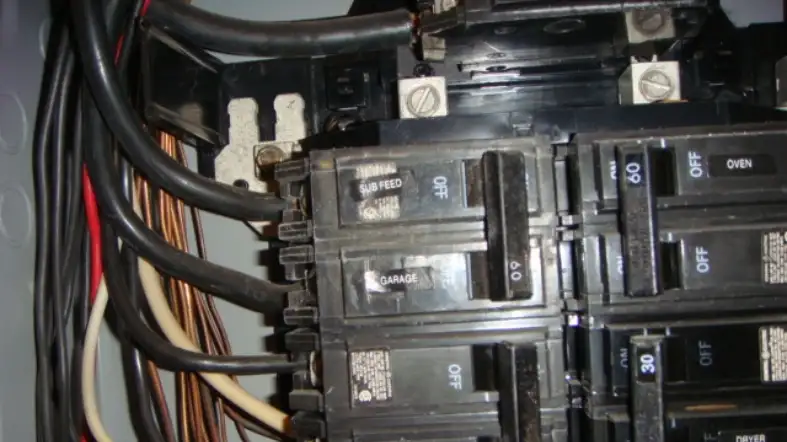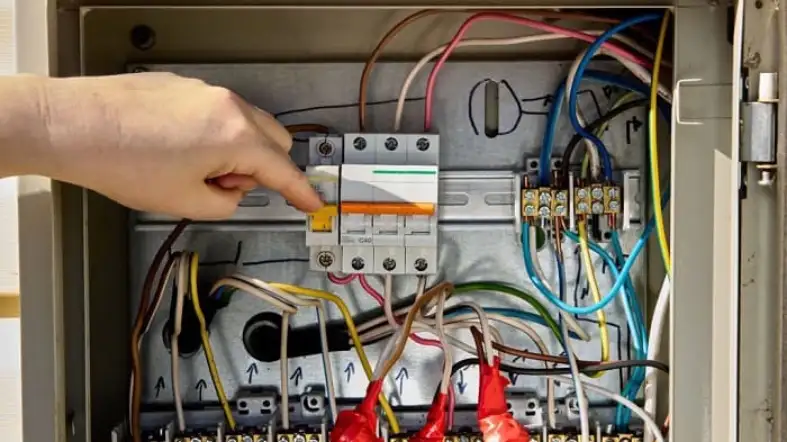Whether you’re powering a workshop or an entire home, knowing what size wire for 60 amp is crucial. Get it wrong, and you risk electrical fires. So, how do you nail this decision?
From the type of load and local electrical codes to environmental conditions and installation methods, it’s important to make an informed decision to ensure safety and performance.
In this blog, we will guide you through the process of calculating the wire size for a 60-amp circuit, and provide you with all the information you need to make an informed decision.

What Size Wire Do You Need for a 60-amp Circuit?
The recommended wire size for a 60-amp circuit ranges from 6 AWG or 4 AWG wire. The optimal wire sizes for a 60-amp circuit are typically 4 AWG if using copper wire, or 3 AWG if using aluminum wire.
Wire Sizes Chart for 60-Amp Circuits:
| Wire Type | Wire Size |
|---|---|
| Copper | 4 AWG |
| Aluminum | 3 AWG |
| Copper-Clad Aluminum | 4 AWG |
Types of Wires Suitable for 60-Amp Circuits
There are three main types of wires that are suitable for 60-amp circuits: copper, aluminum, and copper-clad aluminum.
Copper Wires
Copper wires are the most common type of wire used in electrical wiring. They are highly conductive, durable, and resistant to corrosion. Copper wires are also easy to work with and can be bent and shaped without breaking.
Aluminum Wires
Aluminum wires are another option for 60-amp circuits. They are lighter and less expensive than copper wires but have a lower conductivity. Aluminum wires are also more prone to corrosion and can be more difficult to work with.
Copper-Clad Aluminum Wires
Copper-clad aluminum wires are made by bonding a layer of copper onto an aluminum core.
These wires combine the conductivity of copper with the lightweight and cost-effectiveness of aluminum. Copper-clad aluminum wires are suitable for use in 60-amp circuits.
How to Calculate Wire Size for a 60-Amp Circuit

Calculating the wire size for a 60-amp circuit is important to ensure that the circuit can safely handle the electrical load.
Here are the steps you can follow to calculate the wire size for a 60-amp circuit:
Determine the Wire Gauge
The wire gauge refers to the thickness of the wire. The thicker the wire, the more current it can safely carry. For a 60-amp circuit, you’ll need a wire size of at least 6 gauge if you’re using copper wire.
Consider the Wire Length
The length of the wire also affects its ability to carry current. The longer the wire, the more resistance it has, which reduces its current-carrying capacity.
If your circuit is particularly long, you may need to use a larger wire size to compensate for the increased resistance.
Check the Temperature Rating
The temperature rating of a wire refers to the maximum temperature it can safely operate at. Wires with higher temperature ratings can carry more current without overheating.
When choosing a wire size for a 60-amp circuit, make sure to select a wire with an appropriate temperature rating.
Refer to Local Electrical Codes
Local electrical codes may specify minimum wire sizes for certain types of circuits. Make sure to check your local codes before choosing a wire size for your 60-amp circuit.
For example, let’s say you’re installing a 60-amp circuit in your home to power an electric car charger. You’ve determined that you need a 6-gauge copper wire based on the electrical load and length of the circuit.
However, after checking your local electrical codes, you find out that you need to use an 8-gauge copper wire instead due to specific requirements in your area.
Factors That Influence Wire Size for 60-Amp Circuits

Several factors can influence the wire size you need for a 60-amp circuit. These include:
Type of Load
The type of load on your circuit can affect the wire size you need. For example, motors and other inductive loads may require larger wire sizes than resistive loads like lights or heaters.
For instance, if you have a 60-amp circuit that powers a motor, you may need to use a larger wire size than if the circuit powered a heater.
Local Electrical Codes
Local electrical codes may specify minimum wire sizes for certain types of circuits. Make sure to check your local codes before choosing a wire size for your 60-amp circuit.
For example, some areas may require a minimum wire size of 6 AWG for 60-amp circuits, while others may allow smaller sizes.
Environmental Conditions
Environmental conditions like temperature and humidity can affect the performance of your wires. In hot or humid environments, you may need to use larger wire sizes to prevent overheating.
For example, if you live in a hot and humid climate, you may need to use a larger wire size for your 60-amp circuit than if you live in a cooler and drier climate.
Installation Method
The way you install your wires can also affect their performance. For example, wires that are run in conduit or buried underground may require larger sizes than wires that are run in open air.
If you plan to install your 60-amp circuit wires in conduit or underground, make sure to choose a wire size that is appropriate for those conditions.
Electrical Panel Compatibility
Make sure to choose a wire size that is compatible with your electrical panel. Some panels may have restrictions on the maximum wire size they can accommodate.
For example, if your electrical panel can only accommodate wire sizes up to 4 AWG, you will need to choose a wire size that is 4 AWG or smaller for your 60-amp circuit.
Budget Considerations
Your budget may also influence your choice of wire size. Larger wire sizes are generally more expensive than smaller sizes, so you’ll need to balance cost with safety and performance.
For example, if you have a limited budget for your 60-amp circuit project, you may need to choose a smaller wire size that is still safe and effective but less expensive than larger sizes.
Safety Factors
Safety should always be your top priority when choosing a wire size for your 60-amp circuit. Make sure to choose a size that can safely handle the current flowing through your circuit.
For example, if you have a 60-amp circuit that powers multiple high-power devices at the same time, you will need to choose a larger wire size to ensure that the circuit can handle the load safely.
Dos and Don’ts When Choosing and Installing 60-Amp Wires

When choosing and installing wires for your 60-amp circuit, there are some dos and don’ts you should keep in mind:
Do’s for Choosing and Installing 60-Amp Wires
Do Consult Professionals
Consulting professionals is always a good idea when it comes to electrical wiring. They can help you choose the right wire size for your circuit and ensure that your installation is safe and up to code.
For example, if you’re not sure what wire size to use for your 60-amp circuit, a professional electrician can help you make the right choice.
Do Use the Right Tools
Make sure to use the right tools when installing your 60-amp circuit wires. Using the wrong tools can damage your wires or result in an unsafe installation.
For example, make sure to use wire strippers that are designed for the wire size you are using, and use a torque wrench to tighten connections to the recommended torque.
Do Check Local Codes
Make sure to check your local electrical codes before choosing a wire size for your 60-amp circuit. Local codes may have specific requirements that you need to follow.
For example, some areas may require a minimum wire size of 6 AWG for 60-amp circuits, while others may allow smaller sizes.
Do Follow Manufacturer’s Instructions
Make sure to follow the manufacturer’s instructions when installing your 60-amp circuit wires. The instructions will provide important information on how to install the wires safely and effectively.
For example, if the manufacturer recommends using a certain type of connector or wire stripper, make sure to use those tools to ensure a safe and secure installation.
Don’ts for Choosing and Installing 60-Amp Wires
Don’t Skimp on Quality
Don’t skimp on the quality of your wires. Cheap, low-quality wires can be a safety hazard and may not perform as well as higher-quality wires.
For example, if you buy cheap wires for your 60-amp circuit, they may not be able to handle the current safely, which could lead to overheating or even a fire.
Don’t Ignore Safety Precautions
Don’t ignore safety precautions when installing your 60-amp circuit. Make sure to follow all safety guidelines and use appropriate protective equipment.
For example, when installing wires for your 60-amp circuit, make sure to wear gloves and eye protection to protect yourself from electrical shocks and other hazards.
Don’t Overload Your Circuit
Don’t overload your 60-amp circuit by connecting too many devices or appliances at once. Overloading your circuit can cause your wires to overheat and may even lead to a fire.
Make sure to calculate the total load on your circuit and choose a wire size that can safely handle that load.
Don’t Take Shortcuts
Don’t take shortcuts when installing your 60-amp circuit wires. Make sure to follow all safety guidelines and installation instructions to ensure a safe and effective installation.
For example, don’t skip steps like grounding your wires or securing them properly, as these steps are important for ensuring the safety of your installation.
FAQs
Can aluminum wires handle the same current as copper wires?
No, aluminum wires have lower conductivity and may require a larger gauge to handle the same current as copper wires.
Is copper-clad aluminum wire a good alternative for pure copper wire in 60-amp circuits?
Yes, copper-clad aluminum combines the conductivity of copper with the lightweight and cost-effectiveness of aluminum, making it suitable for 60-amp circuits.
Are all 60-amp circuits subject to the same local electrical codes?
No, local electrical codes may vary, so it’s important to check your area’s specific requirements.
Do longer wires require a larger wire size for 60-amp circuits?
Yes, longer wires have more resistance, reducing their current-carrying capacity, and may require a larger gauge.
Do environmental conditions like humidity affect wire performance?
Yes, hot or humid conditions can affect wire performance and may require a larger wire size.
Conclusion
Choosing the right size wire for a 60-amp circuit is crucial for ensuring the safety and performance of your electrical system.
When in doubt, consult professionals and always prioritize safety. We hope this blog post has been helpful in guiding you through the process of choosing the right size wire for your 60-amp circuit. Good luck!
